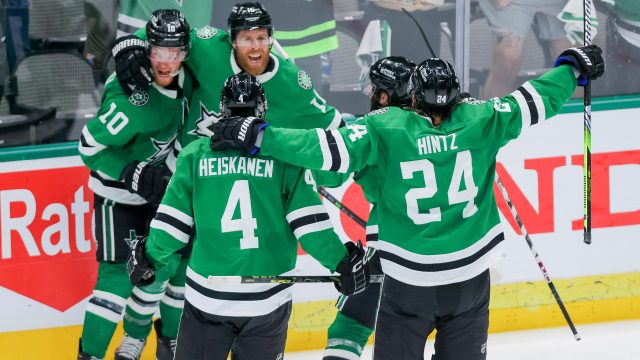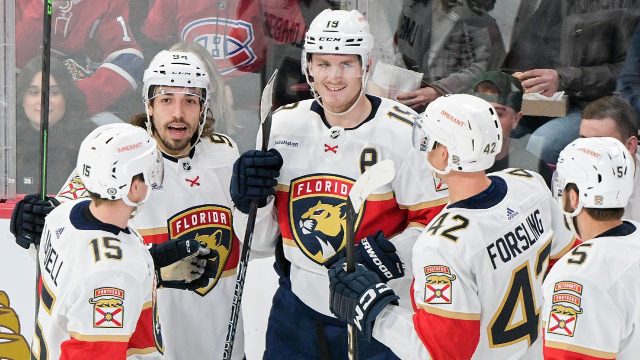
I’ve got a few theories about what happens as the Stanley Cup Playoffs go along, but one of them is that skilled players who are more prone to being shut down with physicality, tenaciousness and intimidation have the chance to re-emerge in the later rounds. Teams pour everything they have into every win and, along the way, the attrition becomes too great, and defensive holes can again be found.
One example is young Jason Robertson, who scored 46 times in the regular season (included in his 109 points), then was slowed to only two goals through 13 playoff games. But with what appears to be some waning ferociousness in the West Final, suddenly he has four goals in his last four games and is starting to look more like the guy he was for Dallas all season long.
While Jack Eichel hasn’t matched Robertson’s recent goal scoring, he has points in three straight, and in Game 4 he tallied seven shots including a number of plays that truly showcased his silky abilities and how they can turn nothing moments into near goals. That’s often how it goes in the post-season – nothing moments rapidly domino to quick goals.
Watch how dangerous he was off the rush on Thursday night:
What Eichel does have is six goals and 11 assists for 17 points in 15 games, which is good for fifth in playoff scoring, with a plus-10 rating. He’s second on his team only to linemate Jonathan Marchessault in expected goals for percentage, he leads all Golden Knights forwards in ice time, and he’s been a pivotal playmaking cog in making Vegas the top offensive team left standing in the playoffs.
Sportlogiq tracks a cumulative stat called “offence generating plays,” which includes shots, slot passes, and skating plays that drive possession to the net. Connor McDavid leads it by a mile both in raw totals despite not playing the third round, and per 20 minutes of ice time. The Oilers captain is followed by Matthew Tkachuk, Robertson, and Eichel, who’s ahead of both Robertson and Tkachuk on a per-20 basis. At 5-on-5, Eichel is the most productive forward left standing.
By the betting odds at a variety of places, the Conn Smythe Trophy favourites are Sergei Bobrovsky and Tkachuk, who are already through to the final, and then Eichel. He sits well ahead of his teammates Mark Stone and linemate Marchessault, both of whom log less ice time and have fewer points the Vegas centre.
Eichel’s play and the opportunity Vegas has in front of it leaves the pivot with a chance to change his reputation in a way that I’m not sure has happened for a player not-named Phil Kessel before, who also got flak for his playing style before breaking through with the Pittsburgh Penguins. Both Kessel and Eichel have had people say “You can’t win with that guy,” and while Kessel proved you can win with him, he did it as the third- or fourth-most important guy on his Cup-winning teams. If Eichel were to win the Conn Smythe Trophy after his roller coaster from huge prospect to “guy you can’t win with” and back, it could fairly make us re-evaluate a lot of talented players who often just need to be put in the right situation to succeed.
It could – for the more reasonable types anyway – also make us realize there’s not some secret sauce that goes into four-round post-season success. We often treat every player who’s ever won a Cup as though they somehow discovered Michael Jordan’s water in Space Jam along the way. Having good players on a well-coached team (which has to be a dozen teams per year) who get some timely saves and breaks along the way is sometimes all it takes.
For truly talented players, I’m not sure there are many who are so deficient in defence or intangibles that you “can’t win with them,” despite plenty of players earning that label.
Eichel’s reputation had taken a beating out of Buffalo after showing himself to be a player who had a lot to learn, despite being heralded as a franchise cornerstone. He didn’t always defend well, had some maturity issues to overcome, and wasn’t quite as ready to solve Buffalo’s problems as fans had hoped. When he dug in on his own medical treatments, some considered it more whinging, rather than a player fairly advocating for the care they’d prefer.
This isn’t to weigh in on any of that, or to say that being five wins away from a Cup somehow absolves a player of all that’s come before.
It’s just to note that as teams continue to pour everything they have into these games, there’s simply less to give, and as mentioned off the top, holes should start to open up again for the skill guys. Eichel is now in a spot where if he can just be the same player he’s shown he is – someone who creates offence for his team at an elite level, often more than a point-per-game – then he’s going to have a lot of people talking about him differently. Re-writing narratives, even.
They’ll say he’s matured or he finally figured it out or he grew up. And some of that may end up being true. He’s been through a lot. But what may really happen here is that Eichel is just going to prove hockey is still just hockey, even in the playoffs, and if you get to play enough playoff games eventually the great players will show us what makes them great. The first two rounds can be a roller derby and car crashes, but as you go on the sample size gets large enough for that truth to shine through.
Vegas is roughly even money to win the Stanley Cup right now, and Eichel is their front-runner to win the Conn Smythe Trophy. Everyone wants guys to run through a brick wall in the playoffs, and not use slight-of-hand to dance their way to the other side. But in the end it doesn’t matter how you get there, and Vegas’s number one centre seems to have a path to that sacred finish, if only his team can muster a handful more wins.
And while his story may need an ending, I’m not sure anyone needs to re-write the parts that came before. The secret sauce of winning the Cup might be better correlated to being good at hockey than some discovery of intrinsic magic.







